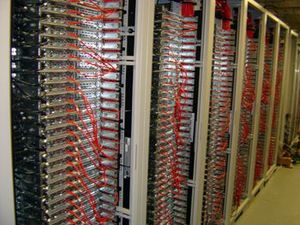
|
| ©Unknown |
| Cluster and racks at Queen Mary, University of London |
The LHC is currently in the final stages of commissioning at CERN, the European particle physics laboratory in Geneva. Once switched on, expected to be in July 2008, it will collide sub-atomic particles inside cathedral-sized detectors, searching for clues to how the universe works. But to discover the next generation of physics, scientists will need to sift through the petabytes (100,000s of Gigabytes) of data that the experiment will produce.
To store and analyse this data will require a whole new approach to computing - the world's largest scientific computing Grid, a massive co-ordination of over 50,000 CPU in 50 countries, creating a virtual supercomputer that can be expanded and adapted. GridPP is the UK's contribution to this Grid, with 10,000 CPU and 700TB (700,000 Gigabytes) of disk storage at 17 sites in the UK. The GridPP grid has already been helping scientists run simulations to prepare for the LHC, running over 7 million computer programs in 2007.
Dave Britton, GridPP's new project leader is looking forward to the future of the project "I am excited to be leading the project as we move into the phase that will start to produce physics. The infrastructure that we have been building up will now be required to process huge amounts of information produced at CERN. With the LHC turn on just months away there is intense excitement, and a certain amount of understandable trepidation, amongst the collaboration but I am sure we will overcome the challenges that are going to be presented in the coming years."



Reader Comments
to our Newsletter